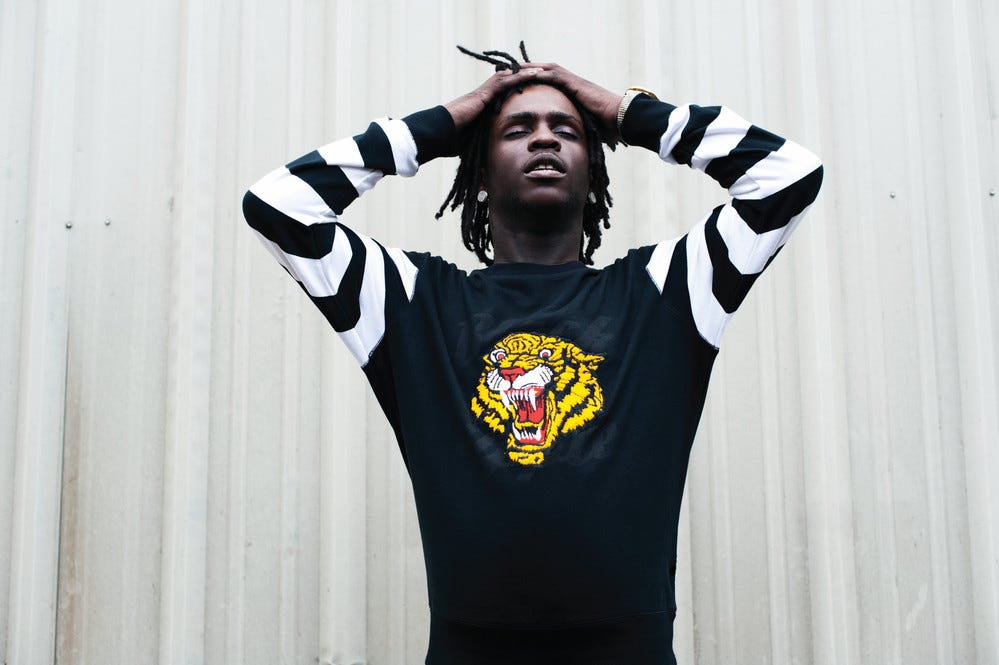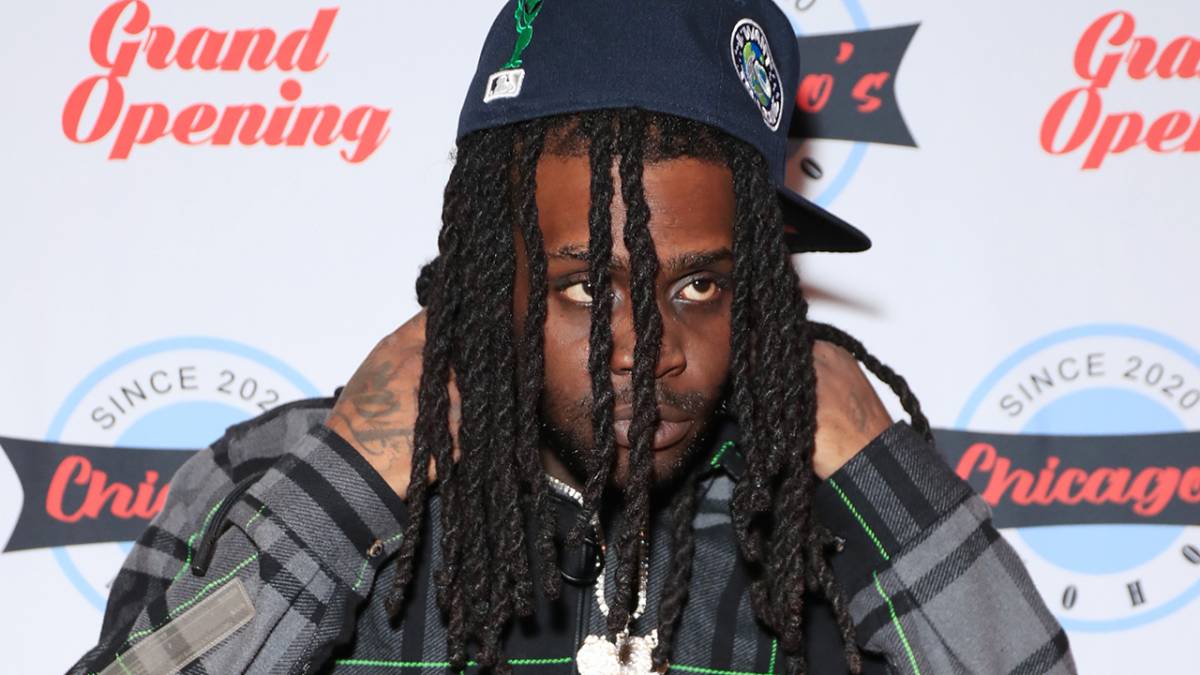SUMMARY:
- Keith Farrelle Cozart, famously known as Chief Keef, was born on August 15, 1995, and has seen a gradual increase in his net worth over the years, from $900,000 in 2022 to an estimated $1 million by 2024.
- As a pivotal figure in the Chicago drill scene, Chief Keef’s music career took off with his early hits, leading to significant record deals and his own label, Glo Gang, contributing to his wealth accumulation despite legal and personal challenges.
- Beyond his music, Chief Keef’s ventures into fashion and digital assets, including collaborations with various brands and involvement in the NFT space, have diversified his income streams and played a crucial role in his financial growth.
Keith Farrelle Cozart, famously known as Chief Keef, has been a defining force in the rap industry since his early teens.
At 28 years old, this Chicago native has not only influenced the sound of modern hip-hop but also amassed a considerable fortune through his music and entrepreneurial endeavors.
Born on August 15, 1995, Chief Keef’s career took off with the viral hit “I Don’t Like,” which quickly catapulted him into the spotlight. His unique style and raw lyrical content have set trends within the genre, earning him a dedicated fanbase and respect among peers. By 2023, Chief Keef’s net worth was estimated to be around $900,000, with projections showing it reaching up to $1 million by 2024.
This financial achievement is a testament to his impact on the music scene, his savvy investments, and his ability to navigate the complexities of fame from a young age.
Chief Keef’s journey from the streets of Chicago to becoming a millionaire rapper highlights not just his musical talent but also his entrepreneurial spirit and business acumen.
Who Is Chief Keef?
Chief Keef, born Keith Farrelle Cozart on August 15, 1995, in Chicago, has become a defining figure in the drill music scene and modern hip-hop.
Below is a succinct timeline of his life, highlighting key events and their significance:
- 1995: Born in Chicago, Illinois – Marks the beginning of Chief Keef’s journey in the notorious South Side, setting the stage for his future in music.
- 2011: Early Legal Troubles – Faces charges related to heroin manufacture and distribution, hinting at the challenges he would navigate in his youth.
- 2012: Breakthrough with “I Don’t Like” – Releases a hit that attracts Kanye West’s attention for a remix, catapulting him to fame and establishing his place in drill music.
- 2012: Debut Album Finally Rich – Introduces hits like “Love Sosa,” solidifying his influence in hip-hop.
- 2012: Arrest for Gun Charges – Begins a series of legal issues that would persist throughout his career.
- 2013: Legal and Personal Challenges – Encounters arrests and court appearances, reflecting the tumultuous side of his rise to fame.
- 2014: Prolific Music Output – Despite legal issues, releases multiple mixtapes, showcasing his dedication to music.
- 2014: DUI Charge in Illinois – Adds to his legal troubles, highlighting the ongoing challenges in his personal life.
- 2015-2017: Continued Legal Issues – Faces lawsuits, evictions, and child support disputes, affecting his financial and personal life.
- 2015-2017: Maintains Musical Influence – Continues to release music and collaborate with artists, keeping his impact in hip-hop alive.
- 2018-Present: Evolution and Business Ventures – Shifts focus to include business endeavors and digital content, expanding his influence beyond music.
Chief Keef’s story from a challenging upbringing to a prominent position in hip-hop is a testament to his resilience and talent.
Despite numerous obstacles, his contributions to the genre and culture have left an indelible mark, making him a significant figure in the music industry.
What Was Chief Keef’s Net Worth In 2023?
In 2023, Chief Keef’s net worth was estimated at around $900,000, a figure that reflects the culmination of his diverse efforts in the music industry and beyond. By 2024, this number was projected to reach up to $1 million, underscoring a trajectory of steady financial growth despite the challenges he faced throughout his career.
Chief Keef’s journey to wealth is deeply rooted in his pioneering role within the drill music scene. His breakout hits like “I Don’t Like” and “Love Sosa” not only garnered millions of streams but also established him as an influential figure in hip-hop. The revenue from his music sales, streaming royalties, and live performances form the backbone of his earnings.
Additionally, his knack for leveraging digital platforms for music distribution further amplified his income, allowing him to capitalize on the shift towards online music consumption.
Beyond music, Chief Keef’s ventures into business and digital content creation have contributed to his net worth.
From merchandise sales to potential partnerships and sponsorships facilitated by his strong social media presence, these endeavors have diversified his income streams. His involvement in the burgeoning world of digital assets and NFTs also hints at his forward-thinking approach to wealth generation.
Despite his financial success, Chief Keef’s lifestyle reflects both the luxuries and complexities of fame. Known for his affinity for high-end fashion, jewelry, and cars, his spending habits showcase the wealthy lifestyle that his success has afforded him. However, his journey also highlights the financial savvy required to navigate the volatile nature of the music industry and maintain wealth over time.
The Rise of Chief Keef: From Chicago to Stardom
Chief Keef’s ascent from the streets of Chicago’s South Side to international hip-hop stardom is a tale of talent, tenacity, and transformation. Born Keith Farrelle Cozart in 1995, his early life was steeped in the challenges and realities of one of the city’s most notorious neighborhoods.
However, it was these very circumstances that shaped his music, giving it an authenticity and rawness that resonated with audiences worldwide.
Keef’s career began to take off in the early 2010s, when he utilized social media platforms to distribute his music. Tracks like “I Don’t Like” and “Love Sosa” became anthems of the drill music genre, a subgenre of hip-hop that Keef is often credited with popularizing.
His gritty narratives, underscored by hard-hitting beats, captured the attention of both local listeners and major artists alike, including Kanye West, who remixed “I Don’t Like” and propelled Keef into the national spotlight.
In 2012, Chief Keef’s debut album, Finally Rich, marked his official entry into the mainstream music industry. The album was both a commercial and critical success, featuring collaborations with established artists and producing hits that cemented Keef’s place in hip-hop. Despite facing numerous legal issues and controversies, Keef’s music continued to thrive, showcasing his ability to channel his experiences into his art.
Chief Keef’s Business Ventures and Investments
Chief Keef, a figure synonymous with the drill music scene, has significantly expanded his horizons beyond music into various business ventures and investments. His entrepreneurial spirit has seen him delve into different industries, leveraging his fame and influence to build a diversified portfolio.
Here’s a list of his notable business ventures:
- Glory Boyz Entertainment (GBE): As part of his contract with Interscope Records, Chief Keef established his label imprint, Glory Boyz Entertainment. This venture not only allowed him to release his own music but also to sign and promote other artists within the drill and hip-hop genres.
- Glo Gang Clothing Line: In 2014, Chief Keef launched his clothing line, Glo Gang. This brand offers a range of apparel and accessories inspired by Chief Keef’s music and personal style. The venture has contributed to his net worth and allowed him to make a mark in the fashion industry.
- 43B Label Partnership with RBC Records/BMG: In a significant move to further his influence in the music industry, Chief Keef partnered with RBC Records/BMG to launch a new label venture, 43B. This collaboration aims to provide artistic autonomy and support to emerging artists, showcasing Chief Keef’s commitment to nurturing talent within the hip-hop community.
- Endorsements and Collaborations: Over the years, Chief Keef has engaged in various endorsements and collaborations, partnering with brands and other artists to expand his reach and influence. These ventures have not only contributed to his wealth but also to his status as a cultural icon in the hip-hop world.
Chief Keef’s foray into business ventures and investments highlights his versatility as an artist and entrepreneur. By capitalizing on his musical success, he has managed to build a substantial net worth and establish himself as a significant figure in both the music and business sectors.
His continued expansion into new ventures suggests a promising future for Chief Keef as a multifaceted entrepreneur.
The Financial Impact of Legal Issues on Chief Keef
Chief Keef’s career has been as much about navigating the tumultuous waters of legal challenges as it has been about pioneering the drill music genre.
These legal issues have not only affected his personal life but have also had a significant financial impact, shaping his career trajectory and influencing his net worth.
From early on, Chief Keef faced a series of legal battles that began to strain his financial resources. His encounters with the law ranged from charges related to gun possession and drug offenses to various civil cases, including child support disputes and lawsuits for missed performances. Each of these instances often resulted in hefty legal fees, fines, and settlements, diverting a substantial portion of his income towards resolving these matters.
Moreover, Chief Keef’s legal troubles have occasionally led to jail time, which directly impacted his ability to produce music, perform live, and engage in lucrative business ventures. The ripple effect of these incarcerations meant lost revenue opportunities, both from his music career and from his entrepreneurial endeavors.
This was particularly evident during the peak of his career when his momentum in the music industry could have translated into significant financial gains.
Comparisons to Peers: Where Chief Keef Stands Amongst Other Artists
Chief Keef, a pivotal figure in the drill music scene and often credited with influencing the “mumble rap” genre, has made a significant impact on modern hip-hop. As of 2024, his net worth is estimated to be between $1 million to $10 million, showcasing a considerable range depending on various sources.
This variance underscores the complexities of measuring an artist’s true financial worth, which can fluctuate based on assets, investments, and revenue streams beyond just music sales.
Let’s see how Chief Keef’s financial standing compares to some of his peers in the rap industry:
- Kanye West: With a net worth estimated at around $1.3 billion, Kanye West stands as one of the wealthiest artists in the music industry, far surpassing Chief Keef. His wealth stems not only from his music career but also from his successful Yeezy brand and other ventures.
- Jay-Z: Jay-Z is another titan of the hip-hop world, with Forbes reporting his net worth to be around $1 billion. His wealth comes from his music, Roc Nation entertainment company, Armand de Brignac champagne, and D’Ussé cognac, among other investments.
- Drake: Drake’s net worth is reported to be around $180 million, making him one of the richest rappers currently active. His earnings are attributed to his music sales, touring revenue, and business ventures, including his OVO clothing line and investments in tech startups.
- Nicki Minaj: Nicki Minaj, with a net worth of approximately $100 million, stands as one of the wealthiest female rappers. Her income comes from her music, acting roles, endorsements, and her Fendi collaboration.
- Lil Wayne: Lil Wayne has a net worth estimated at around $150 million. His wealth is derived from his long-standing career in music, his Young Money Entertainment label, and various endorsement deals.
Comparing Chief Keef’s net worth to these industry giants illustrates the wide economic disparities within the hip-hop community.
While Keef’s influence on the genre is undeniable, his financial success is modest in comparison to artists who have diversified their income streams through extensive business ventures and endorsements.
Conclusion
Chief Keef’s financial success story is as compelling as his music career. Rising from challenging beginnings to achieve a net worth approaching $1 million by 2024, Keef’s journey underscores the potential for transformation through art and entrepreneurship.
His influence extends beyond his wealth; as a pioneer of the drill music scene, he has shaped the sound of a generation and inspired countless artists. Despite the obstacles and controversies that have marked his career, Chief Keef’s resilience and adaptability have allowed him to remain a significant figure in the industry.
As he continues to evolve as an artist and businessman, his legacy is not only defined by his contributions to music but also by his remarkable journey to financial success!








